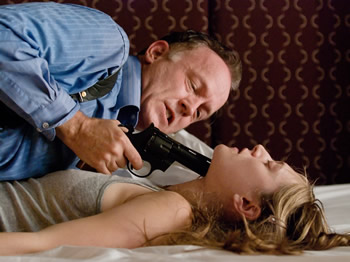
On a Burning Altar
By Caridad Svich
Blasted
By Sarah Kane
Soho Rep
46 Walker St.
Box office: 212-35203101
The violation and near sacrifice of a
colonial body is at the center of Sarah Kane's 1995 play Blasted,
now receiving its New York premiere at Soho Rep under Artistic
Director Sarah Benson's direction. Ian -- a bigoted Welsh journalist
-- enters an anonymously corporate, boutique hotel room in Leeds
at the top of the play, with the specter of illness haunting him,
sex on his mind, and a young, lower-class epileptic woman named
Cate, whom he has been molesting for years, in tow. The play thus
begins as an encounter between two damaged, complex souls: an
aggressor and his victim. A one-night stand is in the offing,
and the first half of the play focuses on the violent, sexually
explicit, demeaning dance of desire between them. Outside, a war
is raging, and soon that war, embodied by a distraught and mentally
destroyed young soldier, will come literally crashing into the
room of wayward privilege and temporary protection.
Damaged youth and the abuse and misuse
of adolescents by an older generation enthralled to sex and consumerism
is a theme that runs through many New Brutalist plays of the 1990s.
This genre of British writing included Mark Ravenhill's Shopping
and F***ing, Jez Butterworth's Mojo, American expatriate
Phyllis Nagy's Weldon Rising, and Philip Ridley's Pitchfork
Disney. This theme reached its apex in David Harrower's Blackbird.
Since Sarah Kane's suicide in 1999, critical discussions of her
work have tended to view it through the lens of autobiography
and her troubled relationship with depression and despair. Enough
time has now passed, however, to reconsider it in the context
of the era when it was written.
In 1996 the Royal Court Theatre and Out
of Joint presented Ravenhill's provocatively titled Shopping
and F***ing at the Royal Court's Theatre Upstairs, directed
by Max Stafford-Clark. The play became the buzz of London and
attracted a large target audience of theatergoers under 25. The
Cool Britannia youth aesthetic dominated the English arts scene
in the 1990s from then on, but it did not begin with Ravenhill's
signature play. The real, unlikely catalyst was Sarah Kane's Blasted
the year before (also at the Royal Court), along with the media
uproar over it.
Critic Aleks Sierz in his book In-yer-face
Theatre (2001) says that Kane's play was significant as a
cultural marker because of its extraordinary vision as well as
for the controversy it excited. He also notes, though, that even
Blasted was not the first work of its kind. The spirit
of shock was already in the air (again) in visual arts, performance,
and film, often described in a facile manner as "the Quentin Tarantino
effect." Theater, always slightly behind culturally, was just
beginning to catch on. Blasted contains scenes of extreme
violence, but it is not the superficial shock-fest that the scandal
surrounding its London premiere suggested. It is a text founded
on the ethics of despair and an investigation of the irrational
in human existence. Only many years after Kane's death would the
play be seen by reviewers as more than a string of escalating
acts of physical and emotional violence.
The media scandal around Blasted
did draw attention to the untapped vitality of new voices writing
for the theater, and actually encouraged producers to seek out,
commission and program their venues with plays written by and
aimed at the 20 to 30-year-old bracket. Stephen Daldry, artistic
director of the Royal Court for much of that decade, was the chief
promoter of these new voices, and the Royal National Theatre Studio,
the Bush Theatre and other venues were also supportive. A savvy
media player as well as a strong, ambitious stage director, Daldry
(whose work will be on Broadway this season with his staging of
his film Billy Elliott) made the Court the top destination
for writing that would focus on the post-Thatcher generation.
Writers such as Judy Upton, Nick Grosso and Joe Penhall were encouraged
to write drama without having to write state-of-the-nation plays,
as David Hare, David Edgar and others did before them. Young was
hip and cool. Old was stodgy and out. Nothing new in a hipster-focused
international media culture, of course, but England (and specifically
London-based theaters and critics) embraced the youth phenomenon
with a vigor quite unlike any other culture. Kane's career thus
benefited greatly from an almost myopic attention paid to young
playwrights in England in the 1990s. Her death in 1999 also signaled
for many the end of the New Brutalist period--despite the fact
that, after Tony Blair came to power in May 1997, New Labour's
promotion of a revitalized arts scene in general, and the youth
movement in particular, were extremely useful to the new, consumerist
project of branding Britain as Cool.
There is a link, albeit modest, in the
tenor of the "angry young men's" writing of 1950s Britain with
the New Brutalism of the 1990s. Both movements marked a return
to the domestic arena, the private realm, in order to illuminate
global concerns. Kane, in Blasted and Cleansed
(1998), examined societies in collapse and ravaged by war, from
the vantage point of a singularly private vision. In the kitchen-sink
dramas of John Osborne's generation, drama also occurred in private
arenas, not in the halls of power and authority. Both movements
also contained an unapologetic sense of impassioned idealism and
cautious hope, burning at the edges of their rage.
In the second half of Blasted,
the stage space is fractured by a mortar shell--an effect made
extremely powerful at Soho Rep by the extraordinarily canny scenic
design of Louisa Thompson and the lighting design of Tyler Micoleau.
At this point, horror and sorrow invade a space already marked
by unfeeling sex, and by bodies irrevocably stained by their cruelty
and indifference toward each other. Before that, Ian, played with
clinical precision by Reed Birney, comes to represent the colonial,
patriarchal body. He demands and claims his territory--Cate's
damaged body and psyche--in the anonymous hotel space. Cate, played
with shell-shocked anomie and humor by Marin Ireland, sucks her
thumb, in a gesture of regression, and falls into epileptic seizures
that suspend time and illuminate, in the form of brief visions,
the history of her fragile emotional state.
The two characters are caught in an unholy
war of domination, submission and protracted revenge. Ian's death-marked
body (racked by an unexplained cough and vestiges of what seems
to be cancer) seeks to conquer her youth and damaged psyche. Her
pliant body seeks comfort and alienation from him at the same
time; the destroyed and the destroyer are involved in an eternally
symbiotic relationship, as in Genet's work. A Soldier, played with cool ferocity and strange, eerie tenderness
by Louis Cancelmi, barges into the room. He terrorizes, sodomizes
and cannibalizes Ian, all the while mourning the brutal death
of his girlfriend in war and the deaths of all those he has murdered
in battle and in acts of mindless, psychotic wartime brutality.
The play, blasted out of civilization and ending on a note of
ironic thanks, ends up mourning for the colonized body: for states
subjected to colonization and for bodies rent by despair. In Blasted,
what has disappeared at the beginning of the play is improbably
regained by destructive means inthe end: an ability to experience
sorrow. The point seems to be to recognize civilization's disappearance
and embrace an elemental saudade (nostalgic longing).
A Soldier, played with cool ferocity and strange, eerie tenderness
by Louis Cancelmi, barges into the room. He terrorizes, sodomizes
and cannibalizes Ian, all the while mourning the brutal death
of his girlfriend in war and the deaths of all those he has murdered
in battle and in acts of mindless, psychotic wartime brutality.
The play, blasted out of civilization and ending on a note of
ironic thanks, ends up mourning for the colonized body: for states
subjected to colonization and for bodies rent by despair. In Blasted,
what has disappeared at the beginning of the play is improbably
regained by destructive means inthe end: an ability to experience
sorrow. The point seems to be to recognize civilization's disappearance
and embrace an elemental saudade (nostalgic longing).
Sarah Benson's committed, honest, and emotional
yet clinically detached production locates the play's mordant
humor and near nihilism, its strangely disembodied pain, and its
equally strange sense of hope. There is a practical, exposed quality
to the final third of the evening -- when the stage is trashed,
broken apart, and de-glamorized in every sense possible -- that
demands that the audience consider what is not "cool," easily
digested and consumed by culture. If indeed we live with war and
its after-effects every day, how do we go on living? And how are
we implicated by our way of living in continuing cycles of destruction
and profit? The production and the play ask these questions in
a bracing and sometimes naïve manner. This, after all, was Kane's
first play, and while there's no question that it is an astonishing
first play, it nevertheless bears the hallmarks of a young writer
exposing her influences and sense of stagecraft to the light.
In her subsequent plays Phaedra's Love, Cleansed, Crave, 4:48
Psychosis and the short filmscript Skin, Kane found
more subtle and idiosyncratic ways of communicating her concerns
about society's ability to mourn and embrace tragedy.
The young British writers of the 1990s
were once dubbed "the new nihilists" by Matt Wolf. To me, though,
their works are more usefully viewed as dialogic, elegiacally
driven reactions to the postmodern, nihilistic condition. They
are like the 19th-century plays and novels written in response
to the industrial revolution, focusing on how the human being
might save himself or herself from turning into a mere cog in
the grand machine. Delineating short-circuited lives, Blasted,
despite its shock veneer, reveals a humanistic interest in exploring
how the individual is corrupted by capitalist greed and unbounded
power-broking (seen here in the arena of the bedroom). Ian "buys"
the outsider Cate a night out in the hotel in exchange for a demand
of forced sex. This othered Cate, victimized by Ian, then seeks
her revenge on his up-market clothes and status. The othered Soldier
then sodomizes Ian and blinds him to the world to which he has
already metaphorically blinded himself in his privileged shell.
At the end of the day the question is: who owns whom, and what
exactly do they own?
From one point of view, Blasted
is part of a transgressive tradition. Two years after its premiere
at the Royal Court, David Cronenberg's film Crash (based
on the J.G. Ballard novel) appeared and created a minor scandal,
as did A.M. Holmes' pedophilia novel The End of Alice,
and Marcus Harvey's Myra, a portrait of the murderer
Myra Hindley, which had been exhibited in the Royal Academy's
"Sensation" show. Kane's work as a whole can be seen as part of
a culture that was at the time wholeheartedly embracing the liberating
function of transgression and exhausting it at the same time.
By the beginning of the 21st century, transgressive art was recognized
almost uniformly by critics as a modern cliché. What, then, continues
to hold our interest in Kane's work?
 Part
of the answer is the way she deals with sex: sex as commerce,
image-making, subjugation and domination. In Kane's work, nothing
matters and everything matters. Constant, fickle arousal is the
norm. Sex is the field of play where all transactions are played
out, personal cost be damned. But in Blasted, of course,
there is a price paid. At the end of a night of rough sex and
escalating violation of Cate, Ian -- the money player struggling
along in his middle-class existence with his bigoted, white supremacist
views -- receives a comeuppance at the hands of the mad soldier.
This soldier (whom Kane originally conceived as a veteran of the
Balkan conflict) subjects Ian, already spiritually destroyed,
to psychological and physical destruction.
Part
of the answer is the way she deals with sex: sex as commerce,
image-making, subjugation and domination. In Kane's work, nothing
matters and everything matters. Constant, fickle arousal is the
norm. Sex is the field of play where all transactions are played
out, personal cost be damned. But in Blasted, of course,
there is a price paid. At the end of a night of rough sex and
escalating violation of Cate, Ian -- the money player struggling
along in his middle-class existence with his bigoted, white supremacist
views -- receives a comeuppance at the hands of the mad soldier.
This soldier (whom Kane originally conceived as a veteran of the
Balkan conflict) subjects Ian, already spiritually destroyed,
to psychological and physical destruction.
This belated New York premiere of Blasted
serves as both a historical marker and a wake-up call challenging
American theatergoers and practitioners to face the atrocities
of humanity head-on, unblinkingly, rather than succumb to an increasing
theatrical penchant for unbounded whimsy and ineffectual decorativeness
in new writing. The production is a welcome, audacious and elegantly
brutal (not "in-yer-face") presentation of a play written in blood
and fire, crackling with a writer's bristling anger and caustic
humor at humanity gone terribly wrong. I can't think of a better
time to experience Kane's blistering sacrificial vision, as an
empire wanes under the weight of hubris and war-mongering, a world-wide
market sways desperately, and a few hundred people in a theater
are asked to behold the specter of civilization splayed on an
altar signaling, to quote Artaud, "through the flames."
